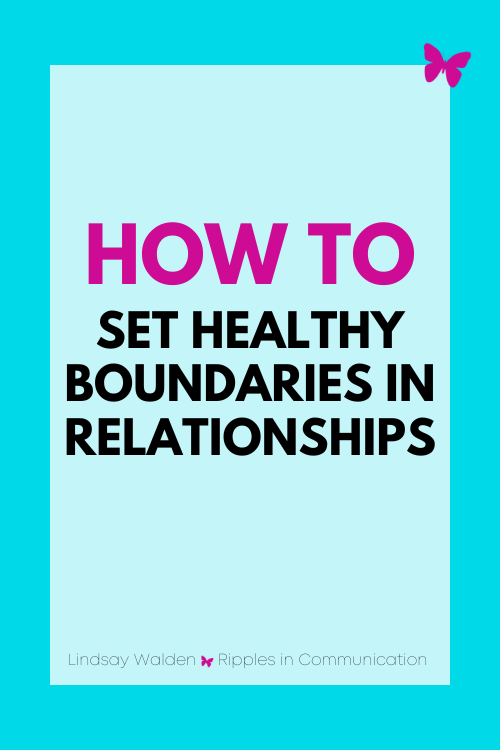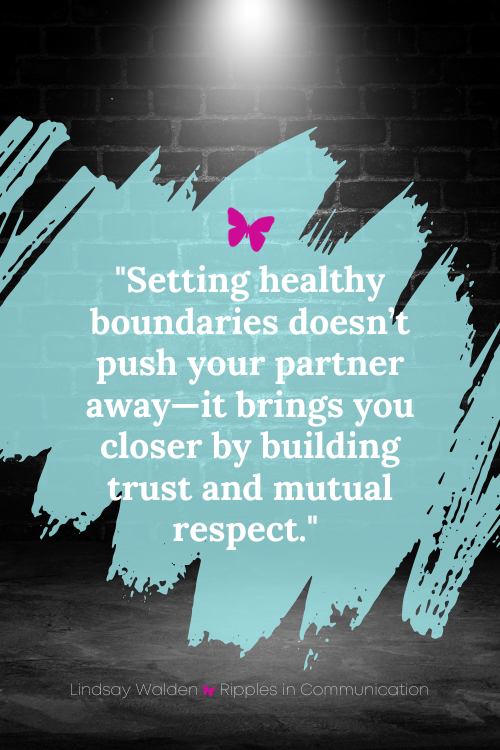How Setting Boundaries Can Strengthen Your Relationship and Build Lasting Intimacy
Boundaries are one of the most important elements of a healthy relationship, yet they are often misunderstood or overlooked. At their core, boundaries help protect your emotional space and promote mutual respect. By setting and respecting boundaries, you create a stronger foundation of trust, communication, and intimacy in your relationship. Through Cognitive Neuro Therapy (CNT), you can better understand how boundaries play a crucial role in maintaining emotional balance and connection.
Have you gotten my FREE Relationship Communication Guide yet? Start building an authentic, conscious, and thriving relationship with your partner TODAY. Say goodbye to misunderstandings, conflicts, and missed opportunities and dive in and learn how to communicate better for a deeper connection. These are the same tips and practical advice I give to my clients every day. With this guide, you'll be equipped to navigate any communication challenge and build a strong and fulfilling bond with your partner. Click the button below to enter your email address and I will send the guide to your inbox right away!
Why Boundaries Matter in Relationships
Boundaries may sound like a way to keep someone out, but they’re really about letting your relationship thrive. Think of boundaries as a way to create emotional safety and self-respect. They help protect you from feeling overwhelmed and allow your brain to stay calm and balanced. When boundaries are in place, you’re able to respond to situations with more control, rather than reacting emotionally in ways that can harm your relationship.
In simple terms, boundaries help both partners feel secure. When you and your partner respect each other’s boundaries, you feel heard, valued, and understood. This creates a sense of safety in the relationship, which is key to building trust and deepening intimacy.
The Brain and Boundaries: Why Cognitive Neuro Therapy (CNT) Works
In Cognitive Neuro Therapy (CNT), we look at how your brain processes emotions and communication in relationships. When boundaries are respected, your brain can stay emotionally neutral, meaning it doesn’t get overwhelmed or stressed out by your partner’s actions. This emotional neutrality helps you regulate your responses, rather than reacting impulsively or emotionally.
For example, when you and your partner communicate clearly about your needs and boundaries, your brain feels safer and calmer, making it easier to engage in healthy and productive conversations. This creates a positive cycle where both partners feel respected and connected, building stronger emotional intimacy.
Struggling to set boundaries without hurting your partner’s feelings? Learn practical tips on how to set healthy boundaries in relationships and create emotional safety. Discover how setting boundaries can strengthen your connection and improve your relationship.
Simple Strategies for Setting and Respecting Boundaries
Let’s break down a few strategies that can help you and your partner set boundaries that enhance your relationship and allow you to connect more deeply.
1. Communicate Openly About Your Needs
The first step to setting boundaries is communicating clearly with your partner about your needs. Whether it’s emotional, physical, or mental space, it’s important to be honest with your partner about what you need to feel safe and respected. This might look like saying, “I need some time to myself when I get home from work,” or “I need you to be more open about how you’re feeling.”
Cognitive Neuro Therapy teaches that clear communication helps your brain process and align its expectations. When you openly express your boundaries, it reduces misunderstandings and prevents feelings from getting hurt.
2. Respect Each Other’s Limits
Once boundaries are set, respecting them is key. This means honoring your partner’s needs without judgment or frustration. For example, if one partner needs alone time to recharge, respect that request and avoid taking it personally. In CNT, we know that respecting each other’s limits reinforces positive emotional patterns in the brain. This respect not only builds trust but also helps deepen intimacy.
When you respect your partner’s boundaries, you’re telling them that their needs matter. This sense of mutual respect allows both partners to feel secure in the relationship, leading to greater emotional connection and closeness.
3. Reevaluate Boundaries Regularly
Boundaries aren’t set in stone. As your relationship grows and changes, your boundaries may need to be adjusted. It’s important to check in with each other and see if your boundaries are still working or if they need to be updated.
For instance, what worked early in your relationship might no longer feel right. Taking the time to reevaluate your boundaries allows you both to stay on the same page and ensures that each partner feels comfortable and respected.
Real-Life Example: Sarah and Emma
To understand how boundaries can work in real life, let’s look at the story of Sarah and Emma, a couple who struggled with different needs for personal space.
Emma, an introvert, often needed time alone to recharge, while Sarah preferred to spend as much time together as possible. This caused tension in their relationship, with Sarah feeling rejected whenever Emma wanted alone time.
Through some open and honest conversations, Emma was able to express her need for alone time without making Sarah feel pushed away. Sarah, understanding Emma’s needs better, respected her request for space. Instead of feeling hurt, Sarah used Emma’s alone time to pursue her own hobbies. As a result, Emma came back to their relationship feeling more energized and connected. Over time, this mutual respect strengthened their relationship, allowing them to trust each other more and build deeper intimacy.
How Boundaries Lead to a Stronger Relationship
Setting boundaries doesn’t just protect your personal space—it also creates the foundation for a healthier, more intimate relationship. Boundaries help you maintain emotional balance, allowing you to be more present and engaged with your partner.
Cognitive Neuro Therapy emphasizes that when boundaries are respected, your brain is better able to regulate emotions, which leads to less stress and more positive interactions with your partner. This creates a sense of safety that allows intimacy to flourish.
Want a stronger relationship? Setting healthy boundaries can actually bring you closer by building trust and mutual respect. Learn how to strengthen your relationship through boundaries and communication.
Final Thoughts: Boundaries Build Emotional Safety
At the end of the day, your brain wants to feel safe in your relationship. Boundaries are one of the best ways to create that emotional safety. They allow you and your partner to communicate openly, respect each other’s needs, and build a relationship based on trust and mutual respect.
By setting and respecting boundaries, you can foster a more intimate, connected relationship where both partners feel valued and understood. Cognitive Neuro Therapy helps couples like Sarah and Emma navigate the sometimes tricky process of setting boundaries, offering a straightforward approach that allows you to strengthen your relationship and deepen your emotional connection.
If you’re ready to explore how Cognitive Neuro Therapy can help you set healthy boundaries and improve your relationship, book a session today. Together, we’ll uncover what’s beneath the surface and help you create the relationship you’ve always wanted.
MORE LIKE THIS
How to Navigate Setting Boundaries With Your Partner Without Guilt
Powerful Boundaries for A Healthy Work Life Balance
Embracing Solitude Together: How To Communicate Your Need For Alone Time In A Relationship







